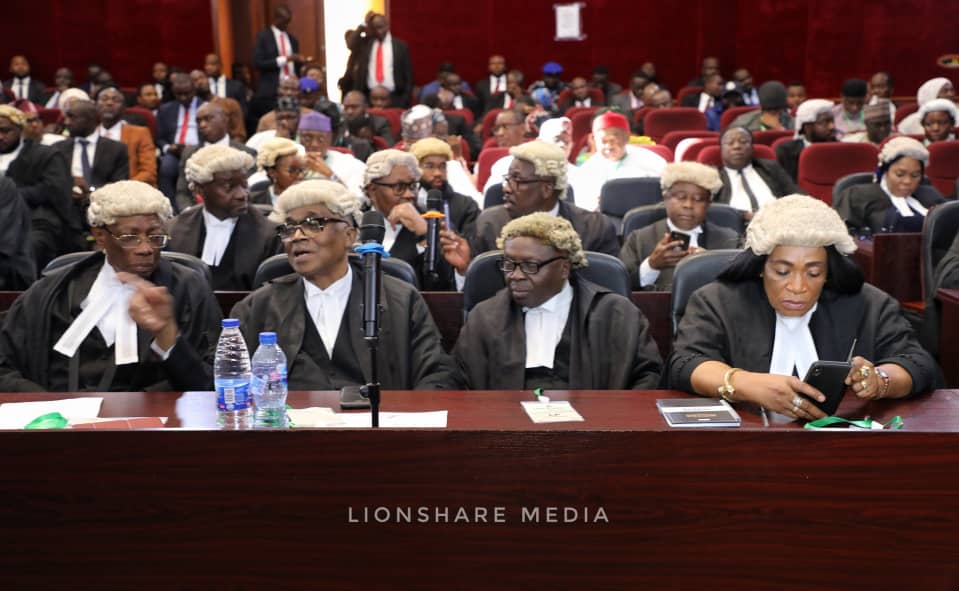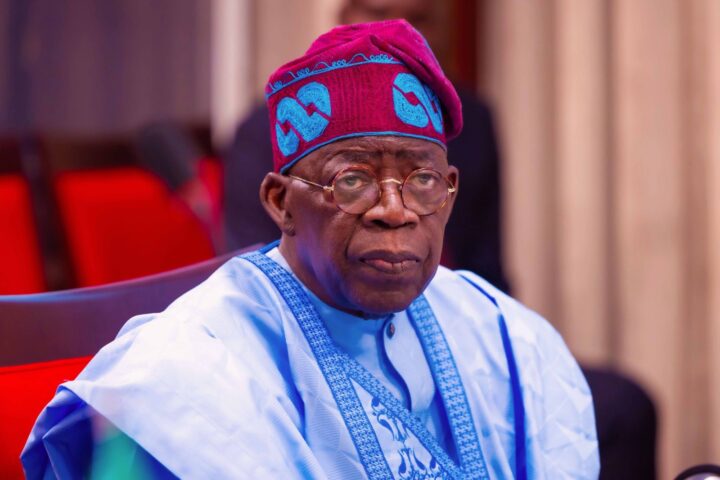BY FESTUS OGUN
The presidential election tribunal sitting in Abuja delivered its judgment yesterday, September 6, 2023. Specifically, the court of appeal finally determined the petitions separately filed by the Allied Peoples Movement (APM) and Labour Party (LP) against Bola Ahmed Tinubu and the All Progressives Congress (APC), the party declared by the Independent National Electoral Commission (INEC) as the winner of the 2023 presidential election.
Similarly, other election tribunals in respect of national and state houses of assembly and governorship elections are already delivering final judgments in petitions before them. Therefore, this article shall briefly discuss the right of appeal of those whose petitions were dismissed (“the appellants”) and salient procedural rules that must be religiously complied with.
RIGHT OF APPEAL
Advertisement
The law is trite that a party affected by a judgment or who has a benefit to derive from the subject matter of a case may appeal any decision of a court or tribunal. Thus, a party to an election petition, inclusive of INEC in deserving cases, has the inherent right to lodge an appeal against the decision of the election tribunal. See: INEC v NYAKO (2011) 12 NWLR (Pt. 1262) 439, 539. For presidential election petition appeals, the supreme court has the final say. For the governorship election appeal, it travels from the tribunal through the court of appeal to the supreme court. However, in respect of national and state houses of assembly, the right to appeal terminates at the court of appeal.
The originating process (first court process to be filed) in an appellate proceeding is the “notice of appeal” which primarily contains the grounds of appeal and the particulars in support. It is also very instructive to note that leave is not required before the filing of a notice of appeal in election petition appeals.
TIMEFRAME FOR FILING OF APPEAL
Advertisement
Generally, by virtue of Section 285 (7) of the 1999 Constitution of the Federal Republic of Nigeria, an appeal from the decision of the election tribunal or court of appeal shall be heard and determined within 60 days from the date of the delivery of judgment at the tribunal or court of appeal.
Section 6 of the Election Judicial Proceedings Practice Directions, 2022 (the practice direction issued by the court of appeal) provides that a notice of appeal shall be filed at the registry of the tribunal or court of appeal within 21 days in respect of a final decision and 14 days in respect of interlocutory rulings. Since this article is in respect of final judgments, the appellants, by virtue of this practice direction, have 21 days from the date of judgment to file their notices of appeal.
On the flip side, Section 2 of the Supreme Court Election Appeals Practice Directions, 2023 stipulates that an appellant shall file in the registry of the court of appeal, notice and grounds of appeal, within 14 days from the date of delivery of judgment appealed against. It is, therefore, safer to file an appeal to the supreme court within 14 days from the date of delivery of the judgement appealed against.
Failure to file a notice of appeal within the prescribed days from the date of judgment renders the appeal incompetent and shall be struck out by the court. See: ANPP V. GONI (2021) 7 NWLR (PT. 1298) 147 @ 182; SIJUWADE V. OYEMOLE (2010) ALL FWLR (PT. 513) 1407; OKOREAFFIA v. AGWU (2010) LPELR-8654(CA). Similarly, a judgement delivered outside the 60 days stipulated by the constitution shall be a nullity.
Advertisement
COMPILATION, TRANSMISSION AND SERVICE OF RECORDS
Upon the filing of the notice of appeal, the appellant shall pay the prescribed fee for the compilation of the record of appeal and furnish as many copies as there are respondents and 10 extra copies for the secretary of tribunal. Further, the appellant shall pay a prescribed fee for the compilation of records of appeal and service of same on all the respondents.
Within 10 days of filing the notice of appeal, the secretary of the tribunal shall compile the records of appeal and serve same on all the parties. It is important to add that by Section 18 of the practice direction, the compilation, transmission, filing and service of all processes in respect of an appeal shall be done electronically as stipulated under the Court of Appeal Rules, 2021. Failure to compile and transmit the records within the stipulated days renders the appeal as abandoned which may put the appeal under the inescapable fate of outright dismissal.
BRIEF OF ARGUMENT
Advertisement
The provision of Sections 10-15 of the practice directions is that within seven days after the service of the records of appeal, the appellant shall file his brief of argument at the court of appeal. The same rule applies to the supreme court. The respondent shall within five days of service of the appellant’s brief of argument file his brief of argument. If and where necessary, the appellant may file a reply brief within two days of the service of the respondent’s brief of argument. However, under the Supreme Court Election Appeals Practice Direction, 2023, an appellant may file a reply brief within three days of the service of the respondent’s brief.
Every brief of argument, either of the appellant or respondent, shall not exceed 40 pages. Additionally, the reply brief shall not exceed 15 pages; under the Supreme Court Election Appeals Practice Direction, 2023, a reply brief shall not exceed 10 pages. The paper upon which the processes are printed shall be in 210mm by 297mm paper size (A4) and shall be typed in either Arial, Times New Roman or Tahoma with font size 14 and 1.5 line spacing. The Supreme Court Election Appeals Practice Direction, 2023 recognises Verdana font and excludes Tahoma.
Advertisement
Instructively, Section 14(c) of the Court of Appeal Practice Judicial Proceedings Practice Direction provides that failure to comply with the provision above renders the violating brief invalid.
At the earliest date before the date set down for the hearing of the appeal, the party who has filed a brief of argument or his counsel shall forward to the registrar of the court of appeal a list of the law reports, textbooks and other authorities which counsel intend to rely on at the hearing.
Advertisement
HEARING OF APPEAL
By Section 16 of the practice direction, oral adumberation will be allowed at the hearing of appeal and 15 minutes shall be allowed for the arguments of each party, unless otherwise directed. At the supreme court, except directed otherwise, only 10 minutes are slated for adumberation.
Advertisement
IMPORTANCE OF ADHERENCE TO PRACTICE DIRECTION
Exercising the powers conferred upon them by the constitution, the Court of Appeal Act, the Supreme Court Act and the Electoral Act, 2022, the president of the court of appeal issued the Judicial Proceedings Practice Directions, 2022 and the chief justice of Nigeria issued the Supreme Court Election Appeals Practice Directions, 2023 – both in respect of election-related matters, including appeals.
In OWURU v. AWUSE & ORS (2004) LPELR-7339(CA), the court of appeal emphasised that the practice directions have constitutional backing and must be strictly obeyed and cannot be circumvented. Our courts have consistently not shown any favour to any party not obeying the provision of the practice direction and this is usually because of the sui-generis nature of election petition. Put simply, failure to comply strictly with the provisions of the practice direction could be very fatal and may vitiate the entire case of the defaulting party. See: OJUGBELE Vs LAMIDI (1999) 10 NWLR (Pt 621) 167
CONCLUSION
It is not acceptable to resort to blackmailing or attacking the hallowed judiciary when judgments are not delivered in favour of a party. What is expected is for the parties to carefully study the judgment and take a position on whether to proceed on appeal or not. Importantly, so as to avoid being knocked out on the basis of barren technicalities, it is very crucial for lawyers and litigants alike to play strictly by the rules of law, inclusive of the provisions of the practice direction, in respect of election petition appeals.
Needless to say that election petitions are sui generis and procedural errors might be very costly. This author has seen many cases where decisions of election Tribunals are upturned on appeal even in somewhat unlikely situations. However, these happen where, beyond the merit of the appeal, the appellants diligently abide by the established rules of election judicial proceedings.
Festus Ogun is a constitutional lawyer and managing partner at FOLEGAL, Lagos. He can be reached via [email protected] 09066324982.
Views expressed by contributors are strictly personal and not of TheCable.






